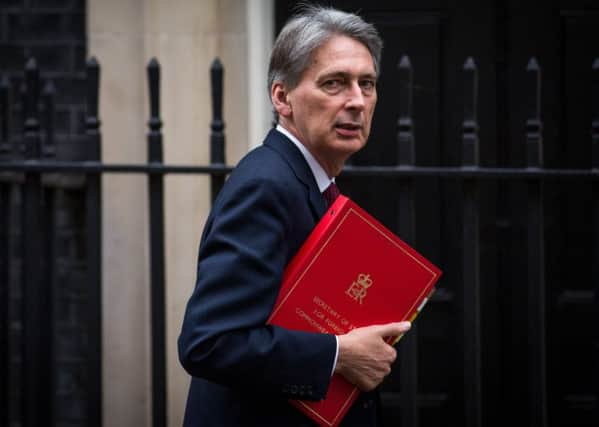Hammond admits UK risks instability without a Brexit transition


The Chancellor warned a hard Brexit could cost “hundreds of millions of pounds” in additional customs checks and conceded that negotiations on the UK’s final relationship with the EU would take longer than the two years set out in the formal Article 50 exit process.
He appeared to contradict comments reportedly made by Brexit Secretary David Davis just three days ago, when Mr Davis told a meeting of City of London chiefs he was “not really interested” in a transitional deal to delay the UK’s withdrawal from single market trading terms.
Advertisement
Hide AdAdvertisement
Hide AdMr Hammond’s comments come as a House of Lords Committee said a transitional deal was “vital” to protecting companies that trade with the EU.
Asked whether a transitional deal would be necessary while giving evidence to a committee of MPs, the Chancellor replied: “There is, I think, an emerging view among businesses, among regulators and among thoughtful politicians - as well as quite a universal view among civil servants on both sides of the English Channel - that having a longer period to manage the adjustment between where we are now as full members of the European Union and where we get to in the future as a result of the negotiations that we will be conducting would be generally helpful, would tend towards a smoother transition and would run less risks of disruption including, crucially, risks to financial stability which must be a fairly real concern.”
Leaving the EU would require an overhaul of customs, with “significant physical infrastructure changes” at UK ports and retraining of “large numbers of people” for more intensive checks on goods at borders, Mr Hammond said.
“It is true that in certain conceivable outcomes, there would be a very substantial increase in the numbers of customs submissions and customs inspections. We are talking about - in EU trade - perhaps five times as many submissions and inspections being required. It could certainly add hundreds of millions of pounds to the cost of operating the customs services.”
Mr Hammond warned that a transitional deal would only take place if there “is a genuine meeting of minds on both sides” during negotiations with the EU.
However, he added: “The further we go into this discussion, the more likely it is that we will mutually conclude that we need a longer period to deliver.”
Commenting on Lords report that calls for the UK’s membership of the EU customs union to be extended for a period after Brexit, Baroness Verma said: “It is unlikely that a bespoke EU trade agreement can be agreed within Article 50’s two-year period, so a transitional deal is vital for protecting UK trade, and jobs that rely on trade.
“The complexity of the issues and the tight timetable require a significant scale-up in capacity in government departments and clear leadership across Whitehall.”
Advertisement
Hide AdAdvertisement
Hide AdLord Whitty, who also sits on the EU Internal Markets sub-committee, said there was “no evidence” that any transitional deal would preserve the level of access the UK enjoys within the single market.
Yesterday Mr Hammond also told MPs he had heard concerns from the financial services industry about the impact of adapting to a new regulatory regime after Brexit, saying the UK would seek to deal on the issue “early on in the negotiations”.
And he said that he would like the UK to continue to take part in cross-European education and research programmes after Brexit.
“Programmes like science, technology, research and development, academic exchange programmes are hugely beneficial to this country and countries across Europe,” Mr Hammond said. “We would very much hope we will be able to agree a format which allows us to continue to participate in those programmes.”